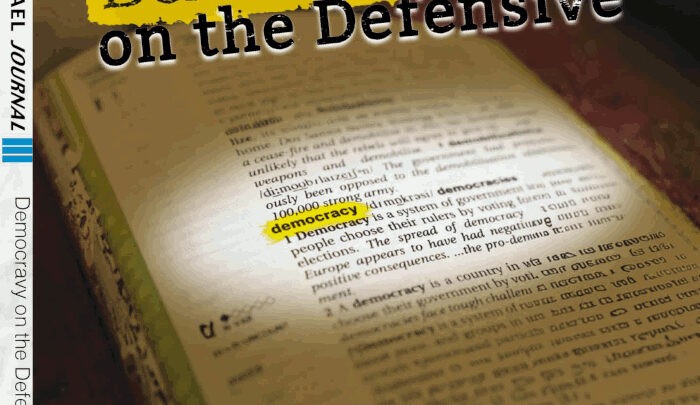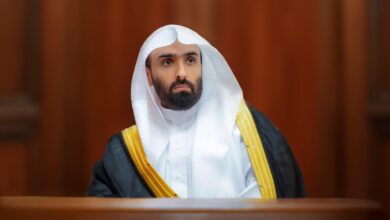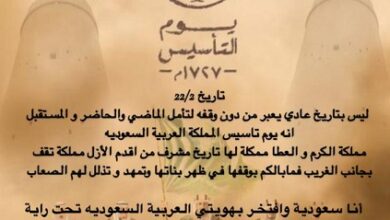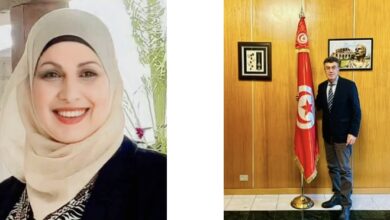The Challenges to Palestinian Democracy: A Catch-22 By Manuel Hassassian

The quest for democracy is emerging as a global phenomenon. In the aftermath of World War II, democracy developed into a universal political norm. The philosophical aspects of democracy that led to the rise of nationalism are a prelude to independence and a prime factor for “the democratization of the peripheralized society.” For democracy to be introduced into a society, it must be strengthened not only on the institutional level but also in sociopolitical structures and processes. World recognition of the principle of national self-determination has culminated in the globalization of democracy, a principle that most Third World societies are struggling to achieve.
The Palestinians are no exception to this. The Palestine Liberation Organization (PLO), as an actor in world politics, could not evade the new global trends of democratization even if it wished to. Hence, it has incorporated these trends into its ideology, structure, and strategy. Its political thinking has been characterized lately by political realism and pragmatism, i.e., choosing between constraints.
Like any other Third World movement, the PLO defines its political and military struggle according to the four elements of national liberation by Neil MacFarlane: 1) political independence, 2) freedom from external economic control, 3) social revolution, and 4) cultural regeneration. For democracy to succeed, however, it must be institutionalized in a way that mediates the multiple and conflicting interests that emerge once statehood is declared.
This process of transition has proven challenging for developing societies because they lack experience in dealing with methods that often hamper their legitimacy and performance. Pluralism in Palestinian politics must be analyzed in the context of the erosion evident in Arab politics; resulting from fragmentation, repressive conditions, economic disparity, and lack of legitimacy and credibility. It is no wonder that the basic tenets of democracy — political participation, power sharing, and public accountability — are nonexistent in the present political system.
Palestinian Civil Society
The evaluation of democratic concepts is organically intertwined with the development of civil societies: a basic tenet that reflects the dynamics of power relationships between government and the public citizens. Palestinian civil society’s power relations were constantly changing at a rapid pace through various political stages affected by the constant pressure of the Israeli occupation. Palestinian civil society during the pre- Oslo period, however, was functional in assuming the role of leadership due to the political vacuum of the PLO’s authority and hence was running under the leadership of the popular committees that were formed during the first intifada of 1988. That said, during the pre-Oslo era, the role of civil society was confrontational with the Palestinian Authority (PA) due to the to the former’s opposition to many of the PA’s policies and actions. In the post-intifada period, the popular committees were dismantled and replaced only by NGOs funded by overseas governments serving their own agendas. With factionalism between Hamas and Fatah, the role of civil society became fragmented and hence weak, fragile, and vulnerable.
During the pre-Oslo period, Palestinian civil society constituted a force parallel to the Israeli occupation authority, providing the Palestinians services such as public health, education, and social welfare. This was detrimental to the presence of the popular committees, which rose to prominence in the absence of the PLO at the time. Furthermore, the essential characteristic of the popular committees was confrontational with the Israeli occupation due to the vacuum of Palestinian leadership and the committee’s support of the Palestinian political movement and organizations in defying the occupying power. Accordingly, the role of civil society bolstered Palestinian society’s steadfastness in the face of the occupation and asserted its identity.
In contrast, the post-Oslo period saw the establishment of the Palestinian Authority (PA), which handled many of the tasks that civil society performed in the pre-Oslo period such as health, education, and social services, marking a major point of transformation from the pre-Oslo civil society to that of NGOs. Thus, the power relations between civil society and the PA developed into hostile relations due to the civil society’s monitoring of the PA’s functional operatives and ineffective policies.
It is important to note that civil society comprises a major component of the ideology of democracy because it epitomizes the functions of society in the social, political, and economic spheres. Hence, it is the catalyst for merging the interests of the public/private spheres. Due to the split between Fatah and Hamas, however, the role of civil society dwindled in the public sphere, leading to the obstruction of its functions. This effectively rendered it powerless and subjugated to both the powers of the PA in the West Bank and Hamas’s control over Gaza. In addition, the instability of the political situation and the fluctuation in policies related to the Israeli occupation exacerbated the inefficacy of Palestinian civil society.
Democracy and Occupation Are Oxymorons
Democracy under occupation is a very intricate concept because relevant variables abound, making it very complex to understand its functionality within the Palestinian experience under occupation. The most important question to ponder is how a democracy can be functional and applicable when there exists an occupation that controls and maintains all aspects of the quotidian life of the Palestinian people, thereby rendering it chaotic, vulnerable, and ultimately unstable. Indeed, democracy and occupation are highly enigmatic oxymorons, and it will be extremely difficult to untangle this complexity because it is a unique experience that is unparalleled in modern history.
.jpg)
Democracy contains basic principles that shape it as a liberal ideology, starting with a constitution, the Basic Law; a parliament, judiciary, and executive powers with a multiparty system; pressure groups and lobbyists; as well as the NGOs, an electoral process with freedom of expression, and the belief which most democratic states contain in their legislative structures that assists in the coordination of relations between the public and private spheres in a peaceful transitional way.
Certainly, Palestinians enjoy a fledgling democracy with a ratified Basic Law, a Legislative Council, and an executive office presided over by the president. Palestinians still cling to the PLO’s factions and, for this reason, they are short of being considered parties according to the French political scientist Maurice Duverger. Nevertheless, it is ironic to see a democratic entity formation under occupation, led by a vibrant civil society and proactive NGOs.
The toughest question to ask is: How can a revolutionary system enshrine democracy when it is utterly circumvented by the occupation’s military policies and actions? How can a civil society function between the occupation’s suppressive policies and total control, with an authority whose control of the Palestinian lands is subservient to that of the occupation and has limited legitimacy and credibility?
Israeli Control Stifles Development
Civil society and the NGOs were more instrumental in their functions before the Oslo Accords. This is evident from a closer look at the infrastructure of Palestinian civil society and NGOs during the pre-Oslo period. The political failure of Oslo affected those working in the third sector i.e. NGOs which were led by activists who abandoned much of their work supporting the peace process. When it comes to the Oslo Accords, this agreement legitimized the Israeli occupation and created a PA characterized by inefficacy despite its aggrandizement.
Israel’s control over fundamental Palestinian rights, resources, and properties made development quite impossible. Due to an overall depoliticization of the Palestinian public, many NGOs had grown tired of the struggle and the pervasive political disillusionment that the Oslo process had created. In light of the aforementioned, the Palestinian public feels trapped and frustrated by the Israeli occupation, the ineffectiveness of the PA due to Israeli stringent policies, the rhetoric of political actions as a whole, and the lack of international support. Other factors that hindered the NGOs’ functionality within civil society were the cultural antagonism toward Israel, the neopatriarchal structure of Palestinian society, the lack of strategic vision on the part of the PA, and finally the stifling effect of Israel’s total control on Palestinian civil society.
The PA conducted two legislative and two presidential elections in the years 1996, 2005, and 2006 with considerable difficulty because of the Israeli restrictionist policies in Jerusalem per se. Unfortunately, due to the Hamas-Fatah split, the issue of the election became a serious bone of contention to date, with mounting pressure on the PA by the international community and, in particular, the EU, its major source of funding.
The Catch-22 is that the authority had contrived to keep civil society vibrant regardless of the occupation’s total control over the Palestinian infrastructure, geography, as well as demography. Another dimension that makes the concept of democracy a Catch-22 situation is the contradiction between an Israeli democracy that caters to the Jews and Israel’s total occupation of the Palestinian people through sheer power. Ultimately, the two democracies are being blurred by objective conditions and reflect a distorted image of the ideals of democracy.
Democracy in the Shadow of Occupation
The quintessential question here is how an alleged democracy by the Israeli authorities can lead to the development of an entire society into a democratic entity, especially when history has taught us that democracies rarely fight each other in war but rather beg to differ. It is a real enigma to talk about Palestinian democracy in the shadow of occupation, where the option of resistance is strongly considered. It is somewhat problematic to have to choose between resistance and liberalism when living in adversity and contending with the subjective and objective conditions of the Palestinian political system per se. Moreover, it is ironic to label the Palestinian political system as less than a state and more than an autonomy; this unprecedented lack of recognition is in and of itself a major hurdle to overcome, explain, and implement.
A keen-eyed observer cannot overlook the discrepancies in Palestinian democracy, which are evident, real, and problematic. For its part, the EU insists on hammering at the PA to conduct elections and uphold human rights at a time when the Israeli occupying authorities hamper the democratization process while keeping Palestinian society in a constant state of disarray. All of the above factors intertwined create this predicament, making democracy impossible to attain.
A sovereign Palestinian state could overcome all of these hurdles after the end of the occupation, but until then it is extremely difficult to surmount these challenges. Democracy, peace, and political accommodation cannot be synchronized in a protracted conflict between two epistemic communities that are at loggerheads. Consequently, Palestinian democracy is best described today as a neighborhood democracy. This Catch-22 situation can be resolved with the achievement of statehood, thus ending the occupation.

.png)



